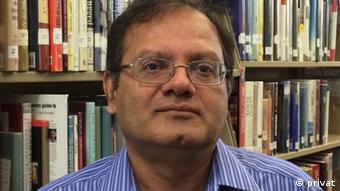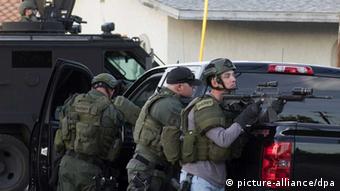The link between California shooters and Pakistan has once again highlighted the danger the country poses as a terror exporter. US-based Islamism expert Arif Jamal tells DW why Washington can no longer ignore the threat.
DW: What sort of links did San Bernardino shooters Tashfeen Malik and Syed Farook have with radical Islamist groups in Pakistan, and how much did they influence the killings?
Arif Jamal: We still do not have authentic information on the links between the San Bernardino mass shooters and radical Islamist groups in Pakistan or elsewhere. Tashfeen Malik was a relatively liberal and modern woman for her family in Pakistan's Punjab province until a couple of years ago. Several members of her family reportedly belong to the terrorist outfit Ahlay Sunnat Wal Jamaat - formerly known as Sipah-e-Sahaba (the Army of the Prophet's Companions) - but there is so far no evidence that she was also an ASWJ member.

Jamal: The Wahhabist and Salafist interpretations of the Quran are at the root of the rise of modern jihadism
Also, the Bahauddin Zakariya University in the city of Multan, where Malik had studied, is a hub of Islamist groups. Although indoctrination must have started much earlier, we see a radical change in her a few years ago, particularly after she moved to the United States. It seems the couple was actually indoctrinated by American Islamic organizations. Islamic organizations conveniently blame Western foreign policies for the rise of jihadism.
How do you analyze the claim by the "Islamic State" (IS) that its "supporters" carried out the attack in the US? What does IS mean by "supporters"?
It is highly plausible that the San Bernardino shooters were influenced by the IS call to take up arms against the infidel West without the practical support from the Middle Eastern militant group. In fact, the available evidence is clearly leading to this conclusion. The IS call for jihad against the West is actually directed at people who are already indoctrinated and need a push to carry out violence. The IS seems to be succeeding in its strategy to destabilize the Western countries.
It's been reported that Tashfeen Malik had met with IS supporter and cleric Maulana Abdul Aziz in Islamabad. Why do Pakistani authorities continue to ignore the threat posed by pro-IS clerics and organizations in the country?
The reports of her links with Aziz of Islamabad's Red Mosque, which is affiliated with the IS, do not seem to be authentic. They are attributed to nameless sources in London and appear to be mere speculation. US officials do not seem to have any such knowledge. As we know that the shooters were influenced by IS and its ideology, it is quite possible that they had had some links with the Red Mosque clerics. If there were any links between the shooters and the Red Mosque, they were more likely ideological.
What is driving Muslims living in the US toward groups like IS?
The most important reason behind the Muslims' fascination with jihadism in the US and elsewhere is their victimhood syndrome. Jihadism teaches them that the failures of Muslims as individuals and as an ummah (community) are caused by the infidels, who must be fought against, as Islamic scriptures order them.
To what extent is Saudi Wahhabism, which many experts believe provides ideological impetus to global jihadi groups, influencing American Muslims?
The Wahhabist and Salafist interpretations of the Quran and hadith are at the root of the rise of modern global jihadism. Unlike other Islamic denominations, Wahhabism and Salafism teach the literal interpretation of the Islamic scriptures. Salafism aims at establishing a caliphate similar to the earliest time in the Islamic history, when the Muslims were constantly at war with the rest of the world. The three biggest jihadist organizations - IS, Jamaat ud-Dawa (or Lashkar-e-Taiba) and Boko Haram - are Salafist.
What, in your opinion, would be the repercussions of the San Bernardino killings on Pakistanis and Muslims living in the US?
Muslims in America have come under severe pressure from the society. There have been some attacks on mosques and Islamic centers. Muslim Americans have reported that the atmosphere in their offices has become tense. Some have told me that they never faced such backlash since the 9/11 attacks. Since one of the two shooters was a woman, Muslim women have also become suspect in the eyes of non-Muslim Americans. Muslim women were not subject to such hateful treatment before.
Will the Obama administration pressure Islamabad to crack down on Islamist radical groups or will it continue with its softer approach toward its ally?
The Obama administration is likely to increase pressure on Pakistan to rein in jihadist groups and close the jihadist factories, but it is highly unlikely it will work in the absence of some sort of economic and military sanctions. The verbal pressure has not worked in the last 15 to 25 years. We may see some halfhearted action by Pakistani authorities against the Red Mosque group if there is enough evidence of their involvement in this shooting. Nothing more.
Arif Jamal is an independent US-based journalist and author of several books, including "Call For Transnational Jihad: Lashkar-e-Taiba, 1985-2014."
The interview was conducted by Shamil Shams.


No comments:
Post a Comment